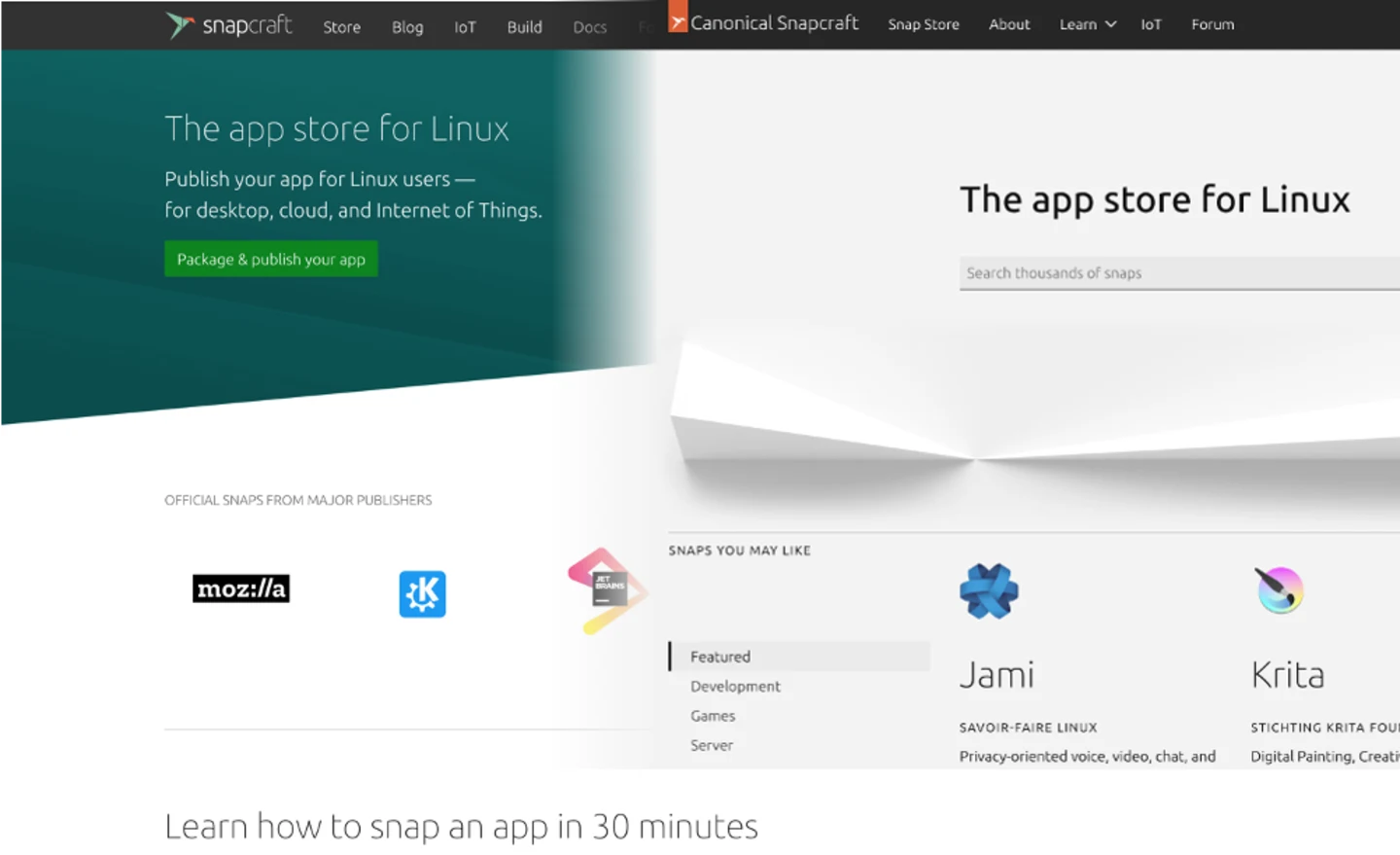
Flying high: Ubuntu 25.04 'Plucky Puffin' is here to deliver better performance to desktops and data centers
Canonical has announced the arrival of Ubuntu 25.04 -- "Plucky Puffin." This latest interim release introduces a number of updates across the desktop, as well as developer tools, and improved hardware support, with a focus on boosting performance and improving the user experience.
Ubuntu 25.04 ships with GNOME 48, offering new features like a Preserve Battery Health mode, HDR support, and Canonical’s triple buffering patches, now accepted upstream. A new Wellbeing Panel helps users manage screen time, while a redesigned install and boot experience adds improved partitioning options and experimental Dracut support for faster system startup.

Linux Mint Debian Edition 7 gets OEM support -- does that signal the impending death of Ubuntu-based Mint?
Umm… something very strange is happening in the world of Linux Mint, folks.
You see, the developers are adding OEM support to Linux Mint Debian Edition 7 (LMDE 7) -- a version of the operating system that’s allegedly nothing more than an emergency fallback. Based on the upcoming Debian Stable release, LMDE 7 will soon be able to be pre-installed on machines sold or donated around the world. That might not sound like a big deal on the surface, but let’s cut through the bull crap -- this could be a sign of something much bigger.

Ubuntu Linux 25.10 will be called Quizzical Quokka and yes that is really the name
Ubuntu 25.10 finally has a name, and it’s one that will probably leave you scratching your head. Canonical has decided to call the upcoming Linux-based operating system “Quizzical Quokka.” That’s not a joke. The announcement was made in a tweet from the official Ubuntu account, which you can see here.
The tradition of using animal-themed alliteration for Ubuntu releases is nothing new, but “Quizzical Quokka” might be one of the oddest yet. A quokka, in case you’re not familiar, is a small, marsupial from Australia -- I had to look it up. But what exactly makes Ubuntu “quizzical” this time around? That part hasn’t been explained.

Ubuntu Linux 25.04 is called Plucky Puffin
Canonical took to Twitter today to announce the name of its next Ubuntu release: Plucky Puffin. Sticking with its tradition of alliterative animal names, this moniker for Ubuntu 25.04 joins the ranks of past versions like Groovy Gorilla and Jammy Jellyfish. While no specific details have been shared yet regarding what features or improvements Plucky Puffin will bring, the name alone is enough to generate buzz among Linux enthusiasts.
Ubuntu has consistently delivered updates that focus on performance enhancements, security improvements, and new features. With each release, Canonical strives to make Ubuntu more accessible and powerful for both casual users and enterprise environments. However, it will be interesting to see if Plucky Puffin offers any major new developments or simply improves existing features. The Linux community will undoubtedly be watching closely for any signs of innovation.

Canonical expands Ubuntu Pro with new distroless Docker image service offering 12-year support
Canonical has introduced a new service enabling the creation of custom distroless Docker images under its "Everything LTS" program. This initiative allows customers to include any open-source software in their Docker images, regardless of whether it is packaged in Ubuntu, with a security maintenance commitment of up to 12 years.
Mark Shuttleworth, CEO of Canonical, said: "Everything LTS means CVE maintenance for your entire open source dependency tree, including open source that is not already packaged as a deb in Ubuntu. We deliver distroless or Ubuntu-based Docker images to your spec, which we will support on RHEL, VMware, Ubuntu, or major public cloud K8s."

Canonical launches real-time Ubuntu Linux 24.04 LTS for time-sensitive computing needs
Canonical has officially launched Real-time Ubuntu 24.04 LTS, a specialized kernel for its popular Linux distribution designed to handle time-sensitive computing tasks with reduced latency and enhanced reliability. This latest release is tailored for industries where high-priority processes must be executed swiftly and with predictable outcomes, such as manufacturing, automotive, and telecommunications.
Real-time Ubuntu 24.04 LTS incorporates the PREEMPT_RT patch for both AMD64 and ARM64 architectures, a leading implementation for Linux real-time systems. This integration is aimed at improving the kernel's predictability and ensuring deterministic responses for applications with critical latency requirements. The new release builds upon the upstream v6.8 kernel and is specifically optimized for use on Raspberry Pi 4 and 5, broadening the scope for innovation and performance in embedded systems.

Canonical unveils Ubuntu Pro for Devices: Enhancing IoT security and compliance
Canonical, the publisher of Ubuntu Linux, has announced the launch of Ubuntu Pro for Devices, a new subscription service aimed at simplifying security and compliance for IoT device deployments. The service provides 10 years of security maintenance for Ubuntu and thousands of open source packages, including Python, Docker, OpenJDK, OpenCV, MQTT, OpenSSL, Go, and the Robot Operating System (ROS).
Ubuntu Pro for Devices offers device management capabilities through Landscape, Canonical’s systems management tool, and access to Real-time Ubuntu for latency-critical use cases. The subscription is available directly from Canonical and through a range of original device manufacturers (ODMs) in Canonical’s partner ecosystem, such as ADLINK, AAEON, Advantech, and DFI.

Ubuntu Linux LTS releases get up to 12 years of support
Canonical, the company behind the popular Ubuntu operating system, has announced a significant extension to the support lifecycle of its long-term support (LTS) releases. The new Legacy Support add-on for Ubuntu Pro subscribers will now provide security maintenance and support for an impressive 12 years, extending the previous 10-year commitment.
This enhancement is available starting with Ubuntu 14.04 LTS and will benefit both enterprises and individual users who rely on the stability and security of Ubuntu for their critical systems. By default, Ubuntu LTS releases receive five years of standard security maintenance. However, with Ubuntu Pro, this is expanded to 10 years for both the main and universe repositories, offering access to a broader range of secure open-source software.

The evolution of open source in the enterprise [Q&A]
Open source software has been around for decades, it's thriving, effective and disrupting in the enterprise more than ever.
We talked to, Cédric Gégout, VP product management at Canonical, to discuss the evolution of open source in the enterprise and protecting its fundamentals for continued success.

Canonical withdraws Ubuntu Desktop 23.10 ISO after discovery of hate speech in translations
Friday 13th has indeed proved unlucky for anyone looking to download the Ubuntu Desktop 23.10 ISO -- it is currently unavailable having been pulled just hours after launch.
The decision to withdraw the Mantic Minotaur ISO was taken after it was discovered that a contributor had inserted malicious translations into the installer. Although Canonical has not revealed the content of the user-submitted translations for the Linux distro, it has been described as "hate speech".

Ubuntu Linux 23.10 'Mantic Minotaur' is here with new features and Raspberry Pi 5 compatibility
Today is a special day for the Linux community as Ubuntu 23.10 (code-named "Mantic Minotaur") is finally released. Yes, folks, following a fairly short beta testing period, the Debian-based operating system can be downloaded now.
Notably, Ubuntu 23.10 is compatible with the latest Raspberry Pi 5 and SiFive HiFive Pro P550 from the get go. It is quite impressive to have support for the very new Raspberry Pi 5 on day one.

Linux users at risk? Canonical uncovers possible security issue in Snap Store!
When it comes to Linux-based operating systems, users don’t have to worry about security, right? Umm, no. Linux distributions are not infallible. For instance, according to a forum post, Canonical's Snap Store recently hit a big security snag when users discovered some new snaps that might contain harmful code. This scary moment shows how even trusted places like app stores can have problems that could hurt users.
Reacting quickly, the Snap Store team removed these bad snaps from the platform, making sure no one else could find or install them. But they didn't stop there.

Ubuntu Linux-maker Canonical unveils a significant Snapcraft.io redesign
Today, Ubuntu-maker Canonical announces a comprehensive redesign of its Snapcraft.io platform. The online store, known for its collection of “snaps” -- software packages designed for Linux distributions -- has taken a major leap forward, moving away from its long-standing user interface and style.
The redesign project, which Snapcraft.io embarked upon after numerous years of maintaining a consistent aesthetic, has been executed with the aim of modernizing the overall look and feel of the platform. The initiative has involved a meticulous analysis of potential improvements, resulting in a two-stage rollout.

Canonical brings OpenStack to small-scale clouds
Canonical has announced the extension of its commercial OpenStack offering to small-scale cloud environments with a new project, Sunbeam.
The project is 100 percent open source and is available free-of-charge, but enterprise customers can also opt-in for comprehensive security coverage and full commercial support under the Ubuntu Pro + Support subscriptions once they’ve completed the deployment.

Canonical and NVIDIA work to make AI more accessible in the enterprise
In 2018, OpenAI reported that the amount of computing power used in large-scale AI training runs had been doubled every 3.4 months since 2012. Around the same time, the volume of data generated also increased dramatically.
This means traditional, general-purpose enterprise infrastructure can't deliver the required computing power, nor can it support the petabytes of data required to train accurate AI models at this scale. Instead, enterprises need dedicated hardware designed for AI workloads.
